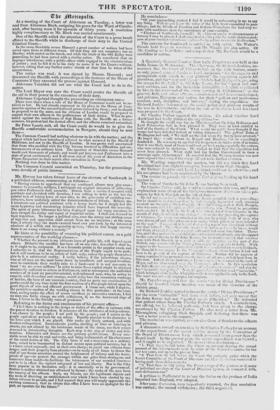Mr. Harvey has taken formal leave of the electors of
Southwark in a published address, commencing as follows- " Having reason to apprehend that my continued silence may give coun- tenance to unworthy artifices, I anticipate my original intention of addressing you when Parliament shall assemble. Driven from a service I accepted with gratitude and cherished with devotion, I was willing to defer to the last the painful task of taking leave of men who, to the generosity of confiding con- stituents, have uniformly added the disinterestedness of friends. Believe me, 1 terminate our political relations with a heavy heart, for I deeply feel the mean hypocrisy and unrelenting injustice which have imposed the necessity. The spirit of party bitterness has been displayed upon too many occasions to have escaped the notice and regret of impartial minds. I shall not descend to their repetition. No longer a political man, eVell the strong and abiding sense of injustice and oppression shall extort from me no invective ; at the same time, I utterly eeny the much-vaunted boast ever put forth by the interested admirers of a selfish and irresponsible system, 'that in this happy country there is no wrong without a remedy.' " He hints at the possibility of resuming his political career, as a paid representative of the working classes— Whether the present is my ultimate leave of public life, will depend upon others. Iiitherto the sacrifice has been all on one side ; hereafter it shall be, as it ought to be, reciprocal. It is a favourite article in the popular creed, and subscribe to it, that the Representatives of the People ought to be paid ; but it will continue to be an article of faith only, unless the people themselves give to it a substantial reality. I verily believe, if the industrious classes, who of all men are the most borne down by inordinate and unequal taxation, were to contribute their weekly mite to a fund—and it is not necessary to boast 4 we are seven millions ' in order to raise it—a capital might be obtained abundantly sufficient to return to Parliament, and to recompense the undivided services of at least six powerful-minded, well-informed men, who, by acting in concert, with discretion and courage, would so lay bare the monstrous workings of faction, the bane of our common country, that no party nor combination of parties could for any time resist the firm resolves of a free people intent upon the great objects of wise and efficient government. I blame not, while I deplore, the penurious caution of the working classes in this particular : at the same time, reeling under the effect of severe sacrifices in successive contests, I feel no man can fairly charge me with selfishness, if, on the downward slope of time, I listen to the friendly voice of prudence."
Referring to the duties and emoluments of his present office-
" I feel there is nothing in the design or duties of the office at variance with the purest devotion to freedom. It possesses all the attributes of independence. I am chosen by the people; I am paid by the people and I return to the people equivalent services for my salary. Equally popular in its character is the fbrce uver which I am placed. Our ranks are freely entered, and with freedom relinquished. Inconsiderate youths, strolling at faire or loitering in streets, are not allured by the boisterous music of the drum low their senses drowned in intoxicating draughts. Each step is the step of choice and deli- beration. Character and fitness are the primary qualifications. Every con- stable must be able to read and write, and bring testhnonials of his observance of the social duties of life. The City force is not a mercenary or a military force, raised to be transported to distant scenes upon political services, but it is a force raised expressly, and at their own charge, to guard our citizens from danger and their property from plunder—to be ready at all times to throw the staff of our Saxon ancestors around the helplessness of infancy and the decre- pitude of age—to protect the stranger within our gates from stratagem, and innocence from insult—to facilitate the intercourse of our crowded streets— and to be in effect the vigilant safeguard of law and liberty. Nor is the City force popular in its formation only: it is essentially so in its government. Station is neither obtained nor advanced by favour; the ranks of the men form the nursery of' the officers. Such, my friends, are the legitimate objects and the mode of directing an establishment over which I have been elected by may fellow citizens to preside, and 1 feel assured that you will amply appreciate the exulting assurance, that to obtain this office I have beeu no apologist for the past, no apostate for the future." He concludes— "Of your approaching contest I feel it would be unbecoming in me to say any thing. Well do you hnow the value of the high trust committed to your charge; and the friends of Freedom and Reform throughout the land may re- - pose with confidence upon the consistency of your example. "Electors of Senthwath, au-en-ell! In whatever scenes or circumstances of fortune I may be plated, I shall eyer cherish with pride the noble disinterested- ness of your conduct towaras Inc; nod resolve by actions to sustain its direction."
The canvass for Southwark is carried on with spirit. Mr. Walter's friends hold fregnent meetings ; and Mr. Wood's are also active. Of Mr. Curling are hear little ; and a report that Mr. Roebuck would be a candidate is untrue.


























 Previous page
Previous page